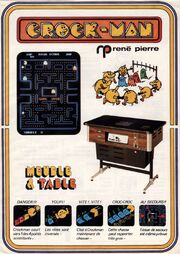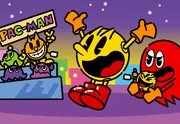
Flyer for "Crock-Man", an early bootleg of Pac-Man
This page details notable clones of Pac-Man, the majority of which were created without authorization of Namco (or a related party).
History
Legal history in North America
Prior to Pac-Man's release, copyright had not been well-established in regard to video games. Throughout the 1970s, games such as Pong and Space Invaders were cloned in dozens of forms. Attempts of litigation against the clones were often unsuccessful, as it was unclear what parts of a video game could truly be copyrighted. A notable case example is in "Atari v. Amusement World" (547 F.Supp. 222); while the defendant's game was a clear gameplay clone of Atari's Asteroids, it was ruled that Asteroids' gameplay mechanics alone would not be illegal to copy.
Following Pac-Man's release, numerous clones of the game would be released. In addition to this, direct bootlegs and hacks of Pac-Man were produced, often sold as "enhancement kits" for the original arcade machines. However, Pac-Man's distinctive features (usage of characters, music, etc.) made the title apply under more forms of copyright; causing clone developers to question which details from Pac-Man could legally be duplicated.

Gameplay of K.C. Munchkin!
Perhaps the most notable early Pac-Man clone was K.C. Munchkin!, released for the Magnavox Odyssey 2 system in 1981. K.C. Munchkin attempted to circumvent potential legal issues by altering various aspects of Pac-Man's rules. Despite this, the game would be still subject to a lawsuit: "Atari, Inc. v. North American Philips Consumer Electronics Corp." (672 F.2d 607).
In the Atari v. Phillips case, the judge found that - once again - copying the gameplay was not illegal. However, the judge noted that K.C. Munchkin's character design still strongly resembled that of Pac-Man; with clear copying of Pac-Man and the Ghosts as characters, the case was ruled in favor of Atari. This lawsuit effectively shaped the legal status regarding copyright of video games, and is often considered to be a landmark case.
Pac-Man clones continued to be produced following the Atari v. Phillips lawsuit, though on a much smaller scale. Generally, future clones would not feature any visuals indicative of Pac-Man, save for the usage of a maze and "dots" to collect.
It is worth noting that overseas, very few lawsuits against Pac-Man bootlegs were actually handled by Namco. The cases were often filed by other companies who possessed the license from Namco; most prominently Atari, Bally Midway, and in the early 2000s, Hasbro Interactive. A few defendants during lawsuits with these parties questioned if said companies could even represent Namco in court, though it was generally assumed that they could.
Legal history in Japan
During the late 1970s in Japan, copyright law for video games was even more questionable. During this period, video games were not eligible for copyright at all in Japan; leading to several companies registering the rights in the U.S. Copyright Office as a "loophole".
In the very early 1980s, one strategy to combat piracy in Japan was for the copyright holder (e.g. Namco) to grant "licenses" to the clone manufacturers. In most cases, these contracts only applied domestically; if the games were sold outside of Japan, they were considered illegal. It is known that Namco's Galaxian was licensed in this way numerous times, reportedly causing confusion with overseas distributors.[1]
Despite the common "clone licensing" practice, it is unconfirmed if this strategy was ever utilized for Pac-Man. Namco is known to have taken legal action against most Japanese Pac-Man arcade hacks, which would indicate they were never (semi)-licensed. However, self-contained handheld Pac-Man clones were very prevalent in Japan; these releases may have used the licensing strategy. It may have been difficult for Namco to license out Pac-Man in Japan at the time, likely due to complications with Tomy (who technically created the Pac-Man character).
After the Atari v. Phillips lawsuit in America, and a successful domestic lawsuit by Konami (against a Frogger bootleg), video games could be copyrighted in Japan. As a strange side effect to this, however, video games were effectively too protected in Japan; with outrageous regulations (and failed attempts of regulation) being enforced in the region. Most infamously, several game companies attempted to ban the sale of used video games in Japan in 1998, including Namco. This "NO RESALE" campaign would eventually be deemed illegal, with the sale of secondhand games being legally protected.
Subpages

Official "anti-piracy" artwork, featuring Pac-Man viewing counterfeit goods of himself.
Due to the ubiquity of Pac-Man clones, it is impossible to document every individual game. The following subpages, divided into six sections, will detail only the most notable clones. Reasons for notability (or notoriety) include titles involved in legal disputes, games with a technically-official "license" granted to them, or other historically significant factors.
- Arcade hacks - Games which are hacked from the original Pac-Man arcade game(s), adding or altering various features (e.g. Hangly-Man, Piranha).
- Gameplay clones - Games which primarily clone the central gameplay of Pac-Man, though do not use any of the original code (e.g. K.C. Munchkin!, Lock 'N' Chase). These games will often feature unique or altered visual and audio design.
- Original games featuring Pac-Man - Originally-coded games which outright use the Pac-Man name and character(s), though were produced under questionable license (e.g. Puckman Pockimon, Hyper Pacman).
- Homebrew works - Titles which are more of hobbyist projects, most commonly released on at-the-time outdated gaming hardware (e.g. Pac-Man 4K for Atari 2600). This can include both hacks and originally-coded projects.
- Multi-game and compilation releases - Compilations featuring pirated Pac-Man games, using the original games' code (e.g. Ultracade, iCade 60-in-1).
- AtGames systems - Dedicated game systems released by the company AtGames, which have had numerous forms of dispute over their license and legality (e.g. Bandai Namco Flashback Blast!).
